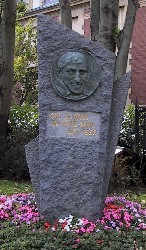I Feel Your Pain

A Vincentian View
Fr. Patrick J. Griffin, CM
“I Feel Your Pain”
I had the honor of speaking to the Trenton Diocesan Council of the Society of St. Vincent de Paul on June 4. The topic offered to me made me think about the little park which rests within the confines of the old estate of St. Lazare—the original home of Vincent and the first priests of the mission.
There is a stone column in that garden into which is carved an image of St. Vincent and a single phrase: 
« J’ai peine de votre peine »
We might translate this phrase colloquially as “I feel your pain.” (The phrase comes from a letter of Vincent to Louise.) What gives this statement a certain poignancy in the current era is that the small park in which the column is located is mostly inhabited by the street people of Paris. They sit around on the benches, or lie on the grass, or wander about. I think that Vincent or Louise would be comfortable here—even though we visitors might not be.
An undeniable element in the character of St. Vincent was his ability to enter into the feelings of the poor. He knew what it was to feel the pain of others—and this is at the heart of the virtue of compassion.
St. Vincent reflects:
We must likewise be moved by our neighbor’s suffering and share his sorrow. O Saint Paul, how sensitive you were on this point! O Savior, You who filled that Apostle with Your Spirit and compassion, help us say with him, Quis infirmatur, et ego non infirmor? Is anyone sick and I am not sick along with him?
Vincent felt and understood compassion—he felt the pain of others. If we go to the Church of Saint Severin, we find the window of him bringing an abandoned child to the Church for Baptism, and then to the Sisters for further care. If we go to the Church of St. Nicholas des Champs, two of the famous paintings of him are found: his helping an afflicted man into his carriage and his willingness to exchange chains with a galley slave. Throughout the city of Paris, there are numerous images of Vincent caring for the abandoned, the infirm, the hungry, and frequently the children. Vincent’s compassionate heart embraced those who were poor in every place he looked, and he enabled others to take on that attitude. He “felt the pain of the poor” and he encouraged those who walked with him to take on that same sensitivity.
One of Vincent’s most stirring talks is given to the Ladies of Charity as he invites them to a bold response in the care of the foundlings. Their charity became tepid over time due to busyness and expenditure. You know the challenge which they felt. Vincent confronts them with an infant:
“Well then, Ladies, compassion and charity have led you to adopt these little creatures as your own children; you have been their mothers according to grace since the time their mothers according to nature abandoned them. See now whether you, too, want to abandon them. Stop being their mother to be their judges at present; their life and death are in your hands. I’m going to take the vote; it’s time to pass sentence on them and to find out whether you are no longer willing to take pity on them. If you continue to take charitable care of them, they will live; if, on the contrary, you abandon them, they will most certainly perish and die; experience does not allow you to doubt that.” (SVdP, 196. – “The Work of the Foundlings” [1647]. CCD 13b. pp. 423-24)
It is not just the eloquence and passion which is evident in Vincent’s words here, but the commitment which he holds out to his supporters. Charity cannot be on-and-off. Will they act boldly in the care of these infants or not? He offers no middle ground. Decide. It can oftentimes be that way with charity. It cannot be for a limited time and according to our schedule, but according to the needs of those who are poor and who (sometimes) cannot plead for themselves. (This is the message which is at the heart of the story of the Good Samaritan.) Their care calls forth a bold and ongoing response. We do not become numbed but continue to feel the pain of others.
As we walk around St. Lazare with Vincent, we can feel the needs of its current inhabitants—people who are hungry, dirty and troubled. Like St. Vincent, we are invited to feel their pain and to discover a way of responding within our limited abilities. And, we do not need to go to Paris to take this walk.
Tags: Griffin







0 Comments